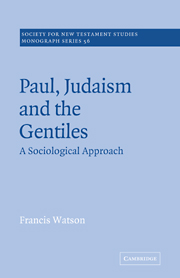Book contents
- Frontmatter
- Contents
- Preface
- Abbreviations
- 1 Paul, the Reformation and modern scholarship
- 2 The origins of Paul's view of the law
- 3 The Galatian crisis
- 4 Philippi, Corinth and the Judaizers
- 5 The situation in Rome
- 6 The social function of Romans: Rom. 2
- 7 The social function of Romans: Rom. 3–4
- 8 The social function of Romans: Rom. 5–8
- 9 The social function of Romans: Rom. 9–11
- 10 Conclusion
- Notes
- Bibliography
- Index
2 - The origins of Paul's view of the law
Published online by Cambridge University Press: 11 November 2009
- Frontmatter
- Contents
- Preface
- Abbreviations
- 1 Paul, the Reformation and modern scholarship
- 2 The origins of Paul's view of the law
- 3 The Galatian crisis
- 4 Philippi, Corinth and the Judaizers
- 5 The situation in Rome
- 6 The social function of Romans: Rom. 2
- 7 The social function of Romans: Rom. 3–4
- 8 The social function of Romans: Rom. 5–8
- 9 The social function of Romans: Rom. 9–11
- 10 Conclusion
- Notes
- Bibliography
- Index
Summary
Historical reconstruction
If we are to understand Paul's view of the law and of Judaism correctly, our starting-point should not be the complex theoretical discussions of the law found in his letters, but the situation in the history of the early church underlying these discussions. It is obvious that there is a close link between Paul's statements about the law and the mission to the Gentiles, and this suggests that the origins of the former are to be found in the origins of the latter. In the first part of the present chapter, we shall investigate the way in which the mission to the Gentiles developed out of the mission to the Jews, and the reassessment of the law which this involved.
A The evidence of Acts
1. One version of the origins of the Gentile mission is given to us by the lengthy account of the conversion of Cornelius in Acts 10:1–11:18. Unlike the otherwise somewhat similar conversion-story in Acts 8:26ff, this one is intended to have a paradigmatic significance: what is being described is not an isolated event but the origin of the Gentile mission, to whose progress much of the rest of Acts is devoted. This is clear from 11:18, where those who had initially opposed Peter's conduct confess, ‘Then to the Gentiles also God has granted repentance unto life.’ Likewise, in 15:7ff Peter's reference to this event serves to justify the preaching activity of Paul and Barnabas among the Gentiles.
- Type
- Chapter
- Information
- Paul, Judaism, and the GentilesA Sociological Approach, pp. 23 - 48Publisher: Cambridge University PressPrint publication year: 1986



